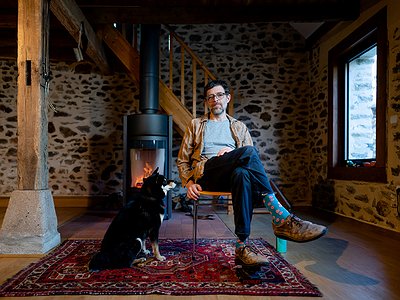Part 1
Name: Eric Chenaux
Nationality: Canadian
Occupation: Guitarist, vocalist, songwriter, improviser
Current release: Eric Chenaux's Say Laura is out via Constellation.
If these thoughts by Eric Chenaux piqued your interest, visit his official website. He also has a dedicated page on the homepage of Constellation Records.
Tell me about your instrument and/or tools, please. How would you describe the relationship with it? What are its most important qualities and how do they influence the musical results and your own performance?
I have been playing a Gibson E175 (1968) hollow-body guitar for the last 20 years. I got it because that is the instrument that Derek Bailey played.
Good enough reason it seems.
I jerry-rigged it through the years, adding a lipstick pick-up and a Bigsby tremolo arm. Besides a nylon-string beater that is around, the 175 is my only guitar. I also use my human-voice (I’ve had it for a while now) and a small ensemble of electronics for the guitar. I use the word ensemble as that is what they feel like to me. I am quite bloody-minded in my playing of them.
I sometimes wonder if it would not be more accurate to say that I often play the electronics, using the guitar as an effect. The wah-wah for example is a way to bring the performance down to my feet, to dance with the music. A form of counter-point perhaps. And, as I just said, a way to draw the breath of the music away from the hands, up through the shoulders, down through the chest, organs, sits muscles, thighs, traversing the knees, shins, circulating through the ankles and spreading out in the palms of my feet. I am not sure about the toes. How could I? I wear shoes.
A quality I enjoy, of my guitar, are the looseness of my strings. I have the guitar strung up with very thin strings in the bass and thicker strings in the top end. A minimal gauge difference between each string, kinda like a mandolin that way. The bass strings bend more easily than the the treble strings and so I mostly play on the bass strings, even for soloing. I believe that to be rather particular.
The guitar seems to enjoy it as well. It has become something of a rubber-band machine. There is always a push and pull, or dance between musical or aesthetic intention and responding to what I hear coming from the instrument. This is a sweet place to play from, this in-between – always-nomadic-space between the materials. I often play the guitar at home without plugging it in. I love un-amplified electric guitar and I do attempt to bring a little of this world into the performances.
What do improvisation and composition mean to you and what, to you, are their respective merits?
Oh yes, the improvisation and composition dozy doe. I believe that I am not alone in having often heard, especially in the parlance of our time, that improvisation can be thought of as a form of composition, some have called it instant-composition even. I believe that all of this makes sense to me.
I also think that it is worthwhile to look under the hood on that one. Do we believe this because composition is serious? Why do we feel the desire to unify or make sense of these two respective qualities? I don’t know. Not at all. I have some assumptions, but, well, they are not worth much. Let’s leave those alone where they belong.
I feel quite a lot of joy from thinking that composition is a form of improvisation. This thought seems more playful to me and breaths a little air into the situation (always looking for air I am). I compose and improvise, I compose so that I can improvise within a form, I am open to ways that the form itself can be improvised. Today, I think that it may be true that everything and nothing composes and improvises and is always in between the two, forever bouncing between, reflecting off of each other. We compose and improvise our breath even! I love them both. They are both great. And the world in-between them is certainly the world I enjoy spending time in.
As a listener, all music that I find lovely and wonderful improvises and composes and both are malleable, porous and open to each other, in co-inhabiting space and time together. It is of very little concern to me whether the music was composed by the composer or improvised by the improvisor. Beethoven’s late string quartets are beautiful improvisations and Derek Bailey’s life work is a stunning composition.
Both composition and improvisation and all of the hairy stuff they share in common are modes of talking about how we understand activity. I believe that there is potentially too much time and effort placed on comprehending activity. Activity may be a wonder! We may be open to not knowing and to being moved by it all. And to give something of ourselves towards that wonder.
Derek Bailey defined improvising as the search for material which is endlessly transformable. Regardless of whether or not you agree with his perspective, what kind of materials have turned to be particularly transformable and stimulating for you?
Can’t argue with Derek Bailey! That guy knew what he was talking about.
That said, all material is is endlessly transformable. How could it not be? What seems to be exhausted or lacking desire to transform is merely the precipice, the gap, the unknowable moment before it sparks its openness to change and reorganise.
But that does not really answer your question and that is what I am happy to be doing, so, I will say that, in thinking about the music I make, that song-form is a material that I find to be constantly and stimulatingly transformable. It is quite amazing what a song can take. What it can have thrown at it, what can be stripped from it, how it is incessantly able and agile enough to encounter space and time with a lovingly and playfully open mind.
Have you ever listened to a favourite song over and over again within a day? Just on a constant loop. Isn’t that nuts?! As material it is endlessly transformable because it endlessly transforms us. I say us as I would be pretty foolish to think that I am alone.
Purportedly, John Stevens of the Spontaneous Music Ensemble had two basic rules to playing in his ensemble: (1) If you can't hear another musician, you're playing too loud, and (2) if the music you're producing doesn't regularly relate to what you're hearing others create, why be in the group. What's your perspective on this statement and how, more generally, does playing in a group compare to a solo situation?
Can’t argue with John Stevens. That guy knew what he was talking about.
I once heard Misha Mengelberg and Han Bennink play and I did not hear Misha for the first 30 minutes as Han was pounding and swinging on the drums, completely burying Misha for most of the concert. At the end of the set, Han stopped and Misha played a little quiet melody and then just stopped. The music just stopped. It was amazing!
Do we need to hear everything? This is about activity again and I am talking about listening. I heard that I was not hearing. This is a form of hearing no? Not always something you wish for I imagine but sometimes, something emerges, an encounter with something that flies in in the face of a preconceived notion, and it alters us. We encounter it psychedelically. Pretty good idea to keep an open mind, it seems to me. And I think Misha enjoyed being buried, to be able to play and be present without being heard, or at least what he was playing not being heard. This absence, this privation, this burial. Wonderful. All of that said, I mostly enjoy sounds to be less than loud.
Concerning relating, well I am not sure about that one. Relating is a pretty open category. Do we wish to hear musicians relate? Not sure I do. Or at least not as an end in and of itself. If a friend is playing her clavinet in the next room and someone else has the radio on in the kitchen and you find yourself gobsmacked by the beauty of it all, is the radio trying to relate to your friend? Is your clavinet playing friend relating to the radio that she may not hear? Are you flustered by the lack of relating or are you encountering something truly psychedelic.
I am not trying to disagree with John Stevens here, I think that he was a wonderful musician and probably a really great teacher and his “two basic rules” probably helped a lot of folks to play together, which is magic. But again, we are talking about activity, which is not music. I don’t think music cares about activity, or not much anyways. I enjoy simultaneity in music which is quite another kettle of fish. It speaks to listening as a psychedelic encounter. As something that can really change and alter you. Rules do seem a little less psychedelic than all that.
It is quite amazing how many different ways music can come into the world, most of them by softly and strangely breaking a rule or two. When I am improvising I am often in many states at once, a present-tense that has ghosts all over the place from other forms of time. I am listening and not listening, I am not listening and listening. I am open to not knowing which side I am on. This is all a lot easier to do when playing with a group, but I I have learned a lot about this in-between state from playing with others and try to open myself up to this space) when I am playing solo. I have a piece that I have not released yet which is called "US Open To Love".
It is an homage to tennis and Paul Bley and a duo between a televised US Open semi-final and nylon-string guitar. I love the sound of music being played when one is concentrating on something else. There is a short-circuiting of intention and concentration that allows and opens up to another world. A world full of sweet hallucinations. A safe place to practice not knowing what the fuck is going on.
There are many descriptions of the ideal state of mind for being creative. What is it like for you? What supports this ideal state of mind for your improvisations and what are distractions? Are there strategies to enter into this state more easily?
Have you ever gone up to a musician after a set and said that you thought it was mind-blowing music only to be told by the musician that they did not like it, that they were distracted, or not in the zone?
Let’s be easy on these musicians for a moment. We get it. They were not pleased with it and they feel uncomfortable about that. Easy to understand. Let’s give them a break here. But, let’s also say that we do not care how they feel, quite aside from the fact that we may care how they feel and do not wish them to feel anything but joy.
I think it may be a worthwhile activity to internalise this problem and wire it right into our practice as music makers. Leonard Cohen remarked that if he knew where the good songs come from he’d go there more often. I think we can modulate that snappy answer to the question of one's state of mind.






